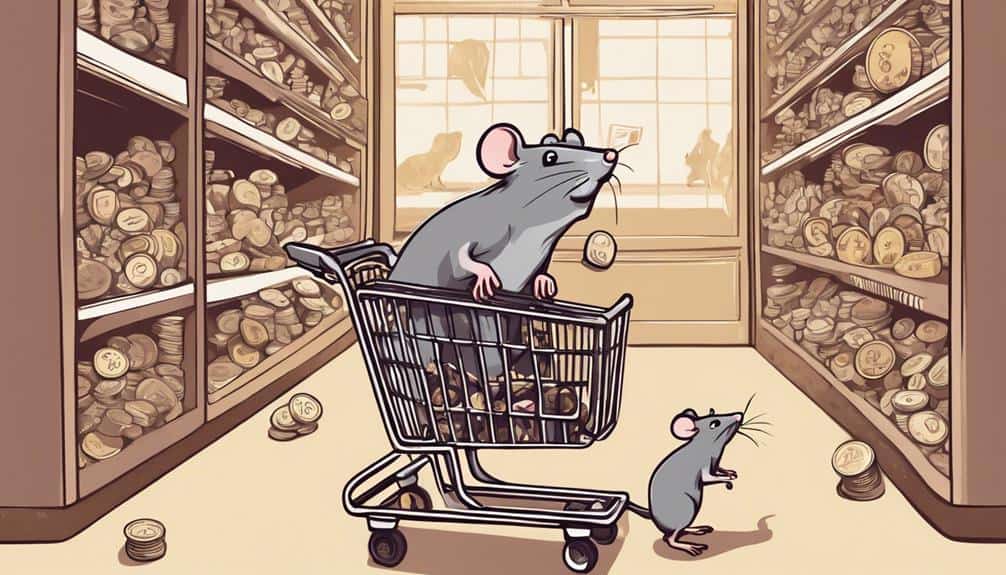You can expect to spend around $200 to $500 upfront on initial setup and equipment costs, and then $50 to $150 per month on ongoing expenses. The overall cost of owning pet rats varies greatly, depending on factors like the source and breed of the rats, cage size, and your level of commitment to their care. From breeder rats to monthly food and vet costs, the expenses add up. But with a clear understanding of these costs, you can better prepare to give your pet rats the best life possible – and there's more to learn about creating the perfect environment for your new friends.
Key Takeaways
• Initial setup costs for pet rats range from $200 to $630, including cage, food, water bottle, bedding, and accessories.
• Monthly expenses include rat food ($5-$15), bedding refills ($10-$30), toys/enrichment ($10-$20), and a vet care fund ($100-$200).
• Breeder rats cost $20 to $50, offering better health and temperament guarantees, while pet store rats may be cheaper but have uncertain health and temperament.
• Cage size and type are crucial, with wire cages larger than 20 gallons recommended, ranging in price from $70 to $300.
• Budgeting for recurring expenses, including vet care, is essential to provide proper care and ensure the well-being of pet rats.
Initial Setup and Equipment Costs
When setting up a habitat for your pet rat, you'll need to budget for the initial setup and equipment costs, which can add up quickly. The first major expense is the rat cage, which can cost anywhere from $70 to $300, depending on the size and quality. It's recommended to invest in a larger cage, as it will provide a more comfortable living space for your pet in the long run.
In addition to the cage, you'll need to purchase water bottles, which typically range from $2 to $10 each. It's a good idea to have at least two water bottles in the cage to make sure your pet always has access to fresh water.
You'll also need to buy food, accessories, and enrichment toys, which can cost around $30 to $50. However, you can opt for DIY alternatives to save money. Bedding is another essential item, with options like loose bedding costing around $20 for 30 pounds or fleece bedding as a more affordable alternative.
When shopping for these items, you can check online stores or visit a local pet store to find the best options for your pet rat.
Ongoing Expenses and Refills
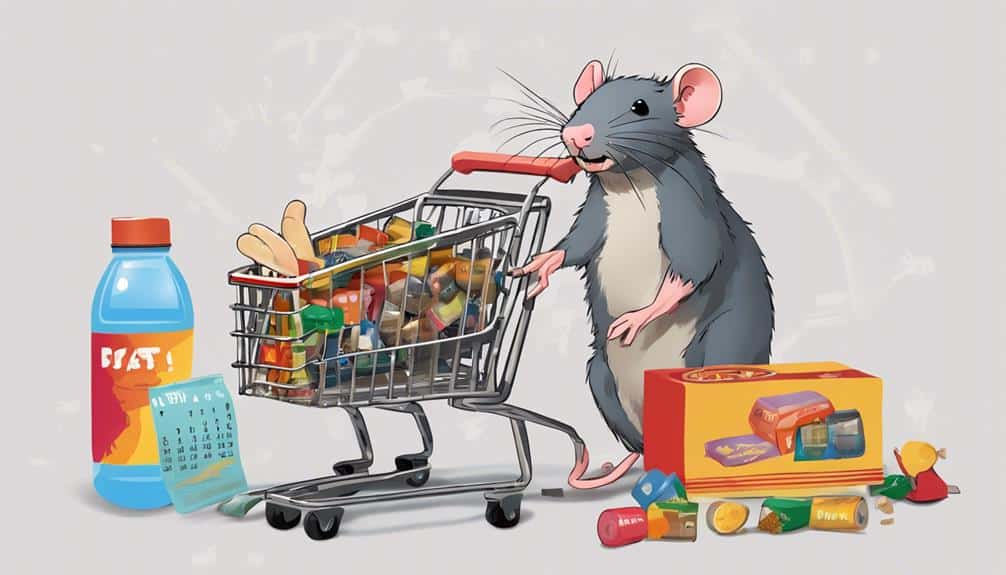
You'll need to factor in ongoing expenses, including refills and replacements, to make sure your pet rat stays happy and healthy. These recurring costs can add up, but with a clear understanding of what to expect, you can budget accordingly.
Here's a breakdown of the typical ongoing expenses for pet rats:
| Expense | Monthly Cost | Range |
|---|---|---|
| Rat Food | $5-$15 | Depends on brand and quantity |
| Bedding Refills | $10-$30 | Loose bedding or fleece options |
| Toys and Enrichment | $10-$20 | For rat entertainment and stimulation |
| Vet Care Fund | $100-$200 | For potential medical expenses |
As you can see, the costs can vary depending on your choices and your rat's needs. However, with a little planning, you can make certain your pet rat receives the care they require to thrive. By factoring in these ongoing expenses, you'll be better prepared to provide a happy and healthy life for your pet rat.
Factors Affecting Rat Prices
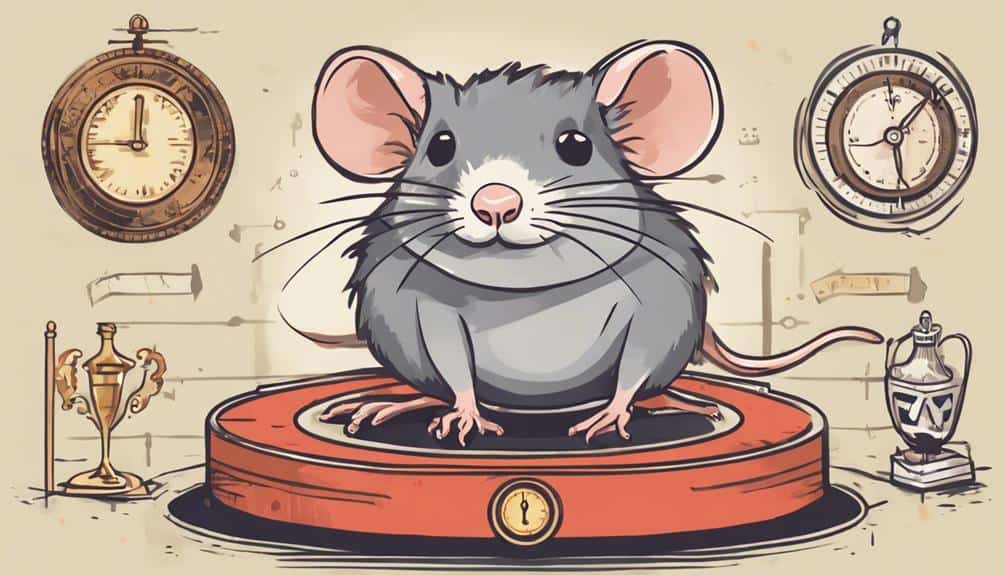
Several factors influence the price of pet rats, including the source, breed, and health guarantees, which can result in a wide range of prices. You'll find that pet rats from breeders typically cost more than those from pet stores. Breeder rats, priced between $20 to $50, often come with better health and temperament guarantees. These higher prices may include initial health expenses and quality assurance.
On the other hand, pet store rats may be cheaper, but their health and temperament can be uncertain.
The price of pet rats can range from $1 to $50 or more, depending on the source and breed. When considering a pet rat, remember that higher prices from breeders may include additional benefits like genetic testing and socialization. While it may seem like a significant upfront cost, investing in a breeder rat can lead to long-term savings on potential vet bills and health issues.
Breeder Rats Vs Feeder Rats
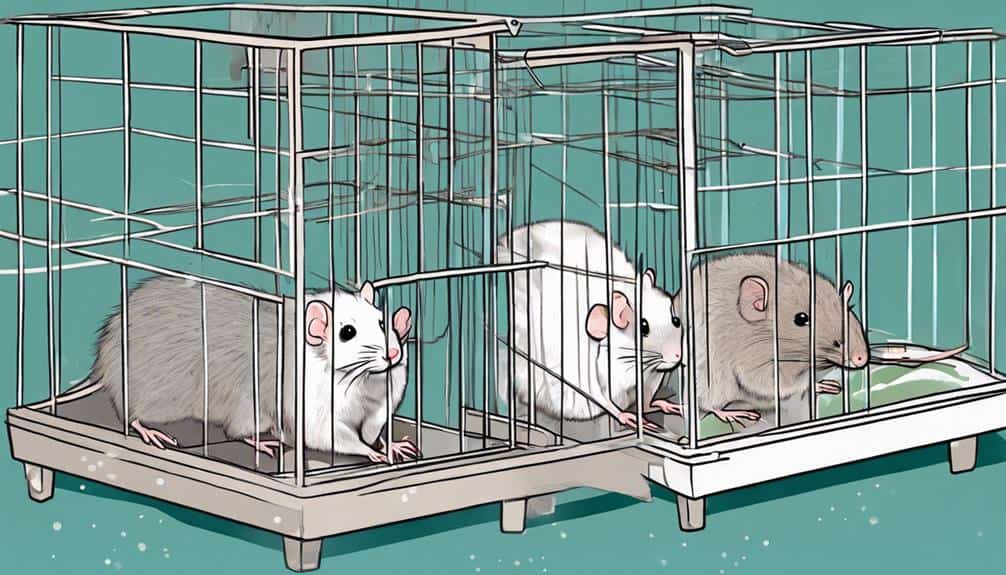
As you weigh your options, it's crucial to ponder the pros and cons of each type of rat before deciding which one to bring home. When choosing between breeder rats and feeder rats, it's vital to evaluate the differences in quality, health, and overall value.
Breeder rats, typically costing $20 to $50, offer better health and temperament compared to feeder rats. They may also come with additional benefits like covering initial health expenses or providing health guarantees. Here are some key advantages of choosing breeder rats:
- Selectively bred for desirable traits, ensuring a higher quality of life and potentially reducing future vet expenses
- Often come with health guarantees or initial health expenses covered
- Typically have better temperaments, making them a more enjoyable pet
On the other hand, feeder rats are usually cheaper, ranging from $1 to $10, but may have unknown health histories and temperaments.
Investing in breeder rats may result in a more rewarding and healthier pet ownership experience compared to feeder rats. By understanding the differences between these two options, you can make an informed decision that suits your needs and preferences.
Cage Size and Type Options
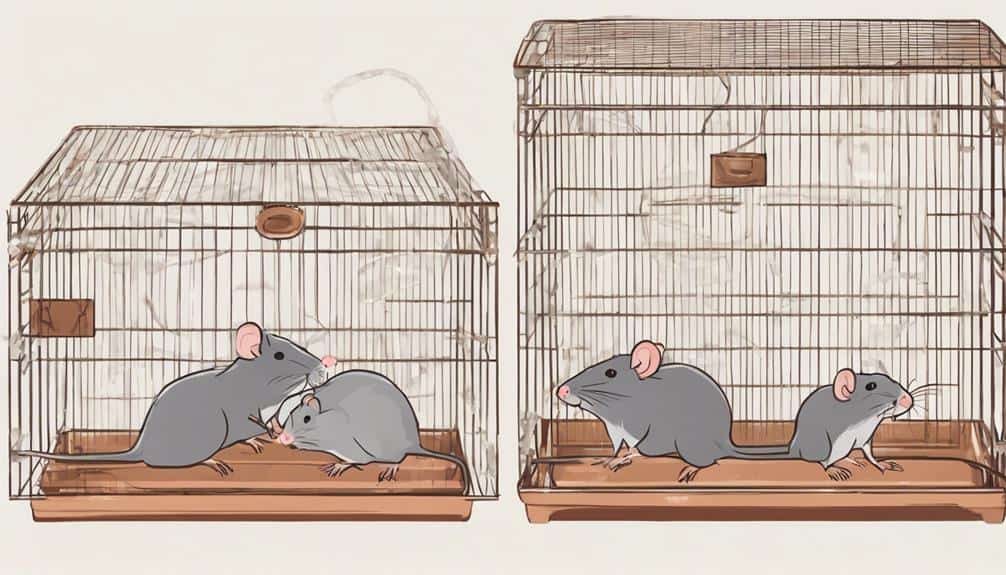
When selecting a cage for your pet rat, opting for a wire cage larger than 20 gallons is essential, with prices ranging from $70 to $300. This size cage provides ample space for your rats to exercise and engage in enriching activities, promoting their physical and mental well-being. Avoid using tanks, as they can lead to ventilation issues and space constraints, which can negatively impact your rats' health.
If you're on a budget, consider purchasing a used cage, which can be a vital option while still providing a suitable living space for your rats. Keep in mind that investing in a larger cage upfront can benefit your rats in the long run, supporting their overall health and happiness.
Food and Water Costs
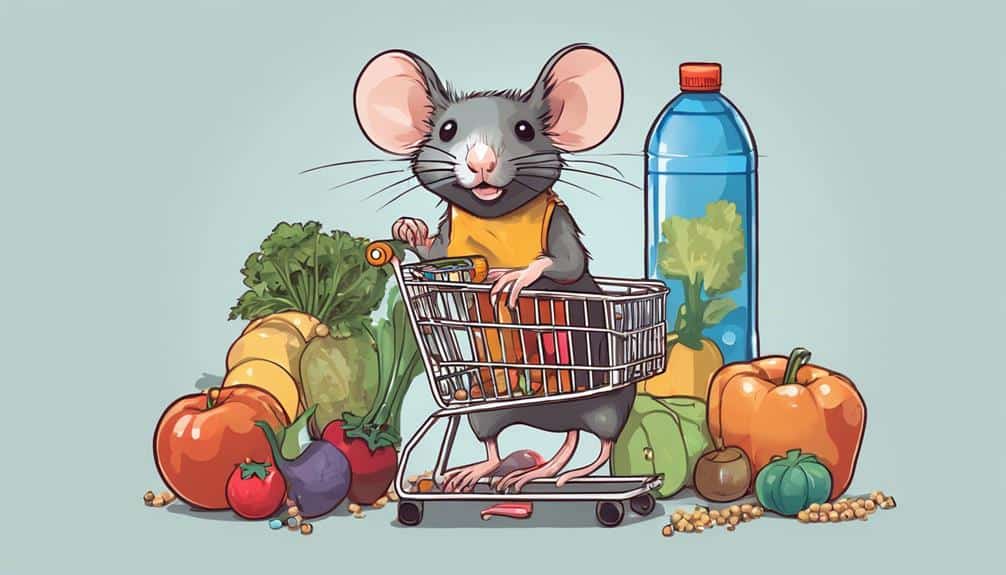
You'll need to factor in ongoing expenses for your pet rats' food and water, which can add up over time. These costs are essential to take into account when calculating the overall cost of owning pet rats.
Here are some estimates to help you plan:
- Food Costs: A 3-pound bag of Oxbow rat food costs around $16 at Petsmart. This amount can last for several weeks, depending on the number of rats you have.
- Water Bottles: Water bottles for rats typically range from $2 to $10 each. It's recommended to have at least two water bottles in the cage for rats.
- Food Bowls: Food bowls for rats can be any dish and don't necessarily need to be specific for rats.
Bedding and Litter Expenses
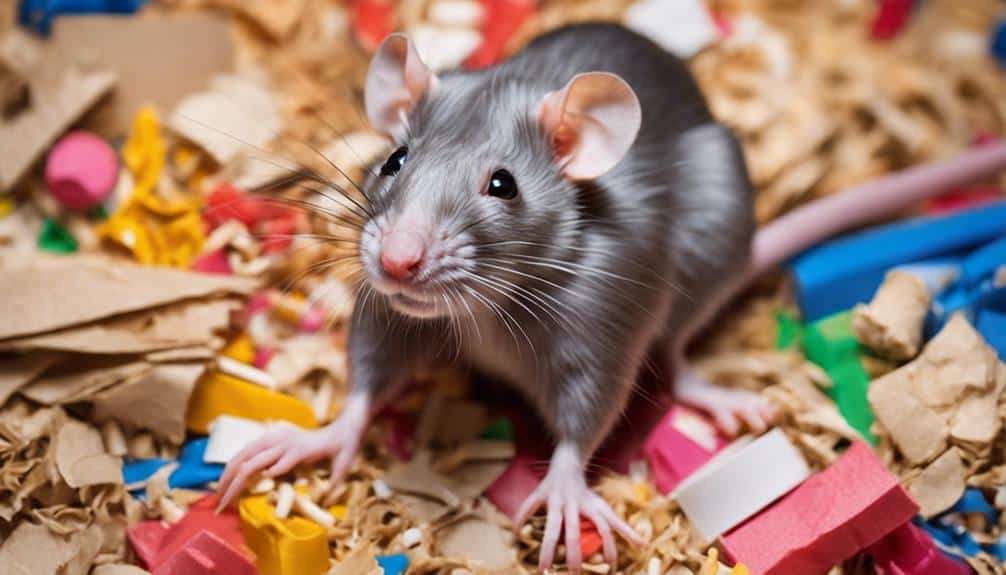
Your pet rats' bedding and litter expenses can add up, but investing in quality options is essential for their comfort and well-being. You'll want to contemplate the type of bedding that suits your preferences, whether it's odor control, absorbency, or ease of cleaning.
Loose bedding is a popular choice, typically costing around $20 for a 30-pound bag that provides multiple uses for cage cleanings. Fleece bedding is another option, offering comfort and easy maintenance. If you're on a budget, ponder checking out tractor supply stores for more affordable bedding options.
Are Maine Coon Cats Expensive to Purchase and Care for, Similar to Pet Rats?
Maine Coon cat size facts can impact their cost and care. While Maine Coon cats can be expensive to purchase due to their large size and popularity, they are not necessarily more expensive to care for than pet rats. Their larger size may require more food and larger litter boxes, but overall expenses vary depending on individual needs.
Toys, Hides, and Accessories
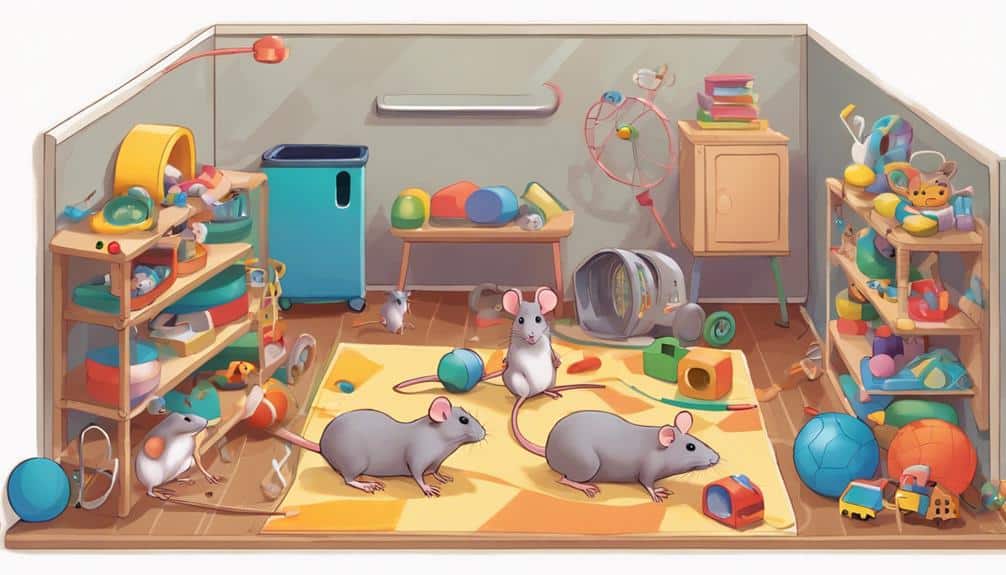
When setting up your pet rat's habitat, you'll want to explore a variety of toys, hides, and accessories to keep them entertained and stimulated.
You'll need to think about what types of tunnels and mazes will keep your rats engaged, what rat-safe materials you'll need, and what hiding place options will make them feel secure.
Tunnels and Mazes
Rats adore burrowing and hiding, making tunnels and mazes a must-have accessory in their cage, providing them with a sense of security and privacy.
As a rat owner, you'll want to provide your pet with a variety of tunnels and mazes to keep them engaged and entertained. These accessories come in different sizes, shapes, and materials, ensuring your rat stays stimulated and exercised.
Some benefits of providing tunnels and mazes for your rat include:
- Encouraging natural burrowing behavior
- Providing mental stimulation and exercise
- Offering a sense of security and privacy in their cage environment
Rat-Safe Materials Needed
You'll need to invest in a variety of rat-safe materials to create a stimulating environment, including toys, hides, and accessories that cater to your pet's natural instincts and curiosity.
Allocate around $30 to $50 for toys and hides that will provide enrichment and stimulation for your pet rats. You can get creative and make DIY toys from household items to save on costs while keeping your rats entertained. Consider purchasing durable toys made of plastic or metal to guarantee longevity and safety for your rats.
Thrift stores can also offer affordable options for rat toys, providing budget-friendly choices for your pets. Simple items like cardboard boxes can serve as inexpensive and enjoyable toys for your pet rats. Additionally, rotate toys regularly to prevent boredom and keep your rats engaged.
Providing a varied and stimulating environment will encourage your rats to explore and play, while also reducing stress and boredom. By incorporating these rat-safe materials, you'll create a happy and healthy environment for your pets to thrive in, and they'll appreciate the effort you put into providing them with a fun and engaging space to live and play.
Hiding Place Options
Providing a diverse range of hiding places and toys is essential for creating a stimulating environment that caters to your pet rat's natural instincts, exploring behaviors, and love for cozy enclosures. You'll want to include a variety of hideouts and toys in the rat cage to promote mental stimulation and enrichment. This will keep your pet rats engaged, active, and happy.
Some great options for hiding places and play areas include:
- Tunnels and tubes for rats to explore and hide in
- Hammocks and igloos for cozy nesting spots
- Cardboard boxes and other creative hideouts for rats to discover and claim as their own
Veterinary Care and Emergencies
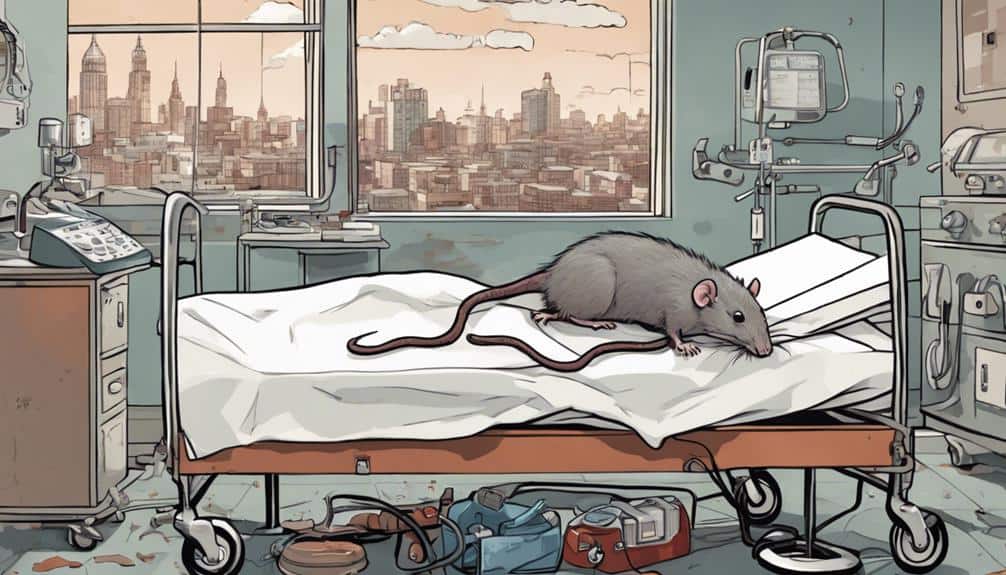
As you prepare for the responsibilities of pet rat ownership, you'll need to take into account the costs associated with veterinary care and emergencies. Regular check-ups, unexpected illnesses, and potential surgical procedures will all impact your pet rat's health and your wallet.
It's crucial to budget for these expenses to guarantee your pet rat receives the best possible care.
Regular Check-Ups
Your pet rat's health relies on regular veterinary check-ups, which typically cost between $40 to $60 per visit. These routine vet visits are crucial to guarantee your rat stays healthy and catch any potential issues early on. You should aim to take your rat to the vet at least once a year for a wellness exam and to address any health concerns you may have.
Regular check-ups can help identify potential health issues before they become severe. Here are some benefits of regular vet visits:
- Early detection of health issues: Regular check-ups can help identify health problems early on, making treatment more effective and reducing costs in the long run.
- Preventative care: Vet visits can include preventative care such as nail trimming, dental checks, and parasite control, which can help prevent health issues from arising.
- Building a relationship with your vet: Regular vet visits can help you build a relationship with your vet, making it easier to get advice and guidance on caring for your pet rat.
Unexpected Illnesses
While regular check-ups can help prevent and detect health issues, unexpected illnesses can still arise, and it's important to be prepared for veterinary care and emergencies that can quickly add up.
As a responsible pet rat owner, you should budget for potential veterinary expenses, especially for unexpected illnesses like respiratory infections or tumors. These unexpected illnesses can be costly, and it's vital to have a fund in place to cover emergency medical expenses. Setting aside $100 to $200 for a vet fund can help alleviate some of the financial stress that comes with unexpected veterinary care.
Rats are prone to hiding signs of illness, making regular vet check-ups crucial for early detection. Timely treatment is necessary, as rats can deteriorate quickly if left untreated.
Surgical Procedures Needed
Surgical procedures, such as tumor removal and respiratory infection treatment, can cost hundreds of dollars, making it important to budget for these potential veterinary care expenses.
As a responsible pet rat owner, you should be ready for unexpected surgical procedures that may arise.
These procedures can be costly, but they're essential for your pet's health and well-being. To avoid financial stress, it's vital to budget for these expenses ahead of time.
Here are some key points to keep in mind:
- Regular veterinary check-ups can help detect health issues early, reducing the need for surgeries.
- Budgeting for potential surgical procedures ensures you're prepared for emergency medical expenses.
- Respiratory infections, in particular, can lead to expensive surgical procedures if left untreated.
Frequently Asked Questions
Are Rats Cheap Pets?
Taking into account ongoing expenses like food, toys, and vet care is crucial.
While rats can be affordable, it's important to budget for potential health issues, like tumors and respiratory infections.
Is It Better to Have 2 or 3 Pet Rats?
When deciding between 2 or 3 pet rats, consider their social needs. You'll find that having 3 rats can provide more natural behaviors and reduce loneliness, but it also means more complex social dynamics.
You'll need a larger cage and more resources to accommodate their needs. Before making a decision, think about the space, time, and resources you can dedicate to caring for multiple rats.
Will you be able to provide the best environment for 2 or 3 furry friends?
Is It Okay to Buy Rats From Pet Stores?
When considering buying rats from pet stores, you should be aware of the potential drawbacks. You may inadvertently support unethical breeding practices, and the rats may lack socialization and have health issues. Additionally, you'll likely pay more than if you adopted from shelters or reputable breeders.
What Breed of Rat Is Best as a Pet?
You're considering bringing a pet rat into your life, and wondering which breed is best for you.
Did you know that pet rats can learn to recognize their names and respond to them?
When it comes to choosing a breed, fancy rats are a popular choice due to their friendly nature and ease of handling.
However, if you're looking for something unique, Dumbo, Rex, Hairless, or Siamese rats might catch your eye with their distinctive features and loving personalities.
